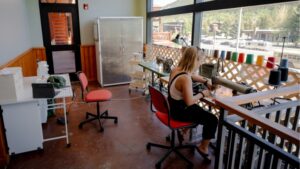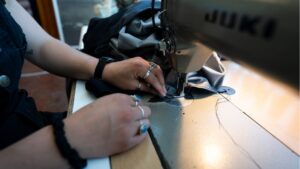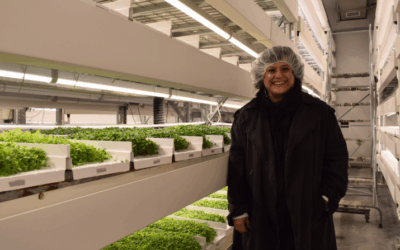To hear the full story and other featured stories, tune into our newest episode of Jackson Unpacked, available wherever you get your podcasts.
Workers in Jackson Hole face unique challenges to power the community. The beauty, wild nature and outdoor access the region offers are some of the great perks of life here. But servers, educators, nurses, home builders and more often have to deal with the high cost of living, long commutes and, for some, learning new languages for their jobs.
In KHOL’s new Workers series, we get to know more about some of the folks that help our community thrive and what drives them to stay here.
–
If one were to stand in downtown Jackson and throw a rock in any direction, there’s a fair chance that the rock would strike either: a) a shop selling garish T-shirts and cowboy hats, b) an art gallery displaying close-ups of grizzlies eating fish, or c) an outdoor gear retailer. As a world-class recreation area and the gateway to the Tetons, it makes sense that Jackson’s residents and visitors love buying all of the aforementioned products—particularly outdoor apparel and equipment.
But buying new gear with every new rip or scuff can be wasteful and expensive. That’s what local entrepreneur Zina Horman thought when she started Rip N’ Stitch, Jackson’s premier gear repair service, alongside her business partner Kat Jacaruso.
“I have had so many friends over the years who are just ready to throw away their gear and they’re like, ‘oh, well, it’s broken. Gotta throw it away. How do I get the next one?’ And it felt like there was a pretty big need for it here in Jackson,” said Horman.
The model of Rip N’ Stitch is simple. With multiple drop-off locations around Jackson and a weekly stand at the People’s Market, customers can bring their gear to the location closest to them. Once there, they fill out a digital form describing their item and the damage it has incurred, then leave their item in the box to be taken to Rip N’ Stitch’s base of operations for repair.
But in Jackson, where it can be next to impossible to find a place to live, let alone a place to run a business, a “base of operations” can take many different forms. For Horman and Jacaruso, that means using a tiny, sweltering hallway jammed between Sidewinders Restaurant and Jackson Hole Whitewater.
“Me and my business partner have always run this out of our house, or houses. And so now we’ve graduated, after a couple of years, to an actual space, which is, you know, loosely defined… Because it’s more of a hallway,” said Horman.
Despite its size, Rip N’ Stitch’s hallway, often abuzz with the rhythmic hum of multiple industrial sewing machines, is enough for Horman to keep up with an ever-increasing need for gear repair. In fact, she is incredibly grateful to have a hallway at all.

Apart from their home base, Rip N’ Stitch travels to People’s Markets and pop-ups around town. (Kieran Hadley)
“I mean, even having a hallway to ourselves has kind of been a pipe dream. And this couldn’t have happened without the support of the community and people who are willing to, you know, put in the effort to make things last and to take care of their stuff,” said Horman.
Being one of Rip N’ Stitch’s co-founders is only one part of Horman’s story though. In addition, she works as a Senior Medical Instructor at Jackson Hole Outdoor Leadership Institute, teaching various wilderness medicine classes full-time, and is a student in the University of Utah’s physician’s assistant program.
“Working two jobs is absolutely necessary for me to be able to afford really anything here,” said Horman. “It’s pretty interesting that having two to four to even five jobs at a time is almost just the inherent trade off that you choose to stick around.”
Horman’s job as a medical instructor also involves a fair share of administrative work. Between that and managing Rip N’ Stitch, as well as trying to find time to spend in the outdoor spaces that drew her to Jackson in the first place, she often finds herself working late.
Horman says her day often starts with some kind of outdoor recreation, such as trail running or skiing, before she begins teaching wilderness medicine courses at 9 a.m. Then, after she’s done teaching at 6 p.m., she heads to Rip N’ Stitch’s hallway to repair gear.
“It’s exciting in some ways,” Horman said. “I’m managing pretty much two small businesses, which can be a lot and takes up a lot of bandwidth. And I use all that extra bandwidth to be outside, which is why we’re here.”
And though it can be stressful to manage her time, Horman loves both of her jobs. Her favorite part of repairing gear, she said, is the unique way in which it allows her to connect with the community.
“We’ve had lots of fun stories of, you know, ‘I guided in this jacket in the Himalayas and I, I really want to to continue wearing it.’ Or this guy got married in the ski pants that he brought to us and wanted to make sure that they were going to continue to be used. And so my favorite part is just getting to engage with the community and, and see people be really excited about, you know, the repairs that we’re doing,” said Horman.
Horman’s situation, which might seem extreme to most Americans, is commonplace in Teton County, which has been called the most unequal county in the United States when it comes to wealth. In Jackson, it is normal for those on the losing end of that wealth gap to work two, three, or even four jobs in order to stay afloat.
In fact, Rip N’ Stitch was founded through the necessity of filling every available space in Horman’s schedule with work.

Running Rip N’ Stitch barely fits into Hormans’ already packed schedule. Still, she makes it happen. (Kieran Hadley)
“I originally moved to Jackson to be a guide on the river and then ended up sticking around, to [ski] patrol,” said Horman.
Patrolling led her to wilderness medicine, which became her primary profession. But the seasonality of her other jobs meant that she needed something else to make ends meet.
“[I] kind of had an empty space in the times where I wasn’t teaching or guiding or patrolling and wanted to fill that with, ideally, fixing things,” she added.
Horman is pursuing her academic degree in order to hopefully be able to live more comfortably in Jackson, but she acknowledges that even as a physician’s assistant – a job which normally brings with it a salary about twice the national average – she might be hard pressed to afford living in Teton County.
“I’m working towards being a PA so that maybe in the future I can afford to be here sustainably. But I think even as a physician’s assistant, you have to get really creative in order to have a sustainable life here in Jackson,” she said.
Despite the stress and workload she incurs with multiple jobs and her academic program, Horman reiterated how grateful she is to be able to be a part of Jackson’s community.
“I would say that it’s tricky, but, you know, ultimately it’s what allows me to, to be in Jackson and to be somewhere where there’s such incredible access and such a beautiful community,” she reflected. “I feel lucky to get to serve that community in both ways, you know, being able to give gear a second life and then also being able to share the knowledge that I have and you know, help people develop their medical skills in the backcountry.”
To hear the full story and other featured stories, tune into our newest episode of “Jackson Unpacked“, available wherever you get your podcasts.







